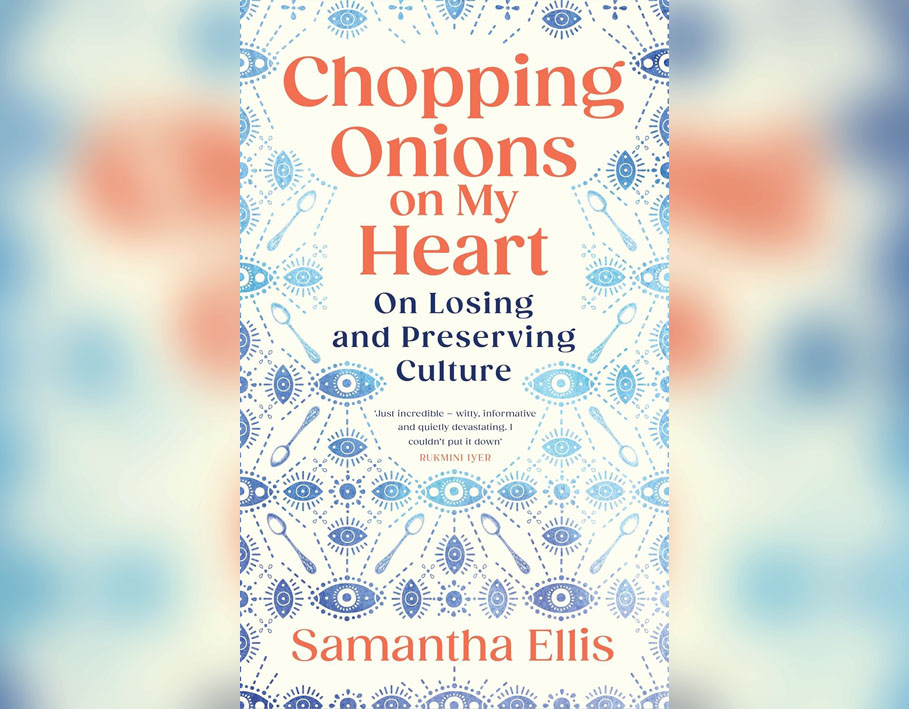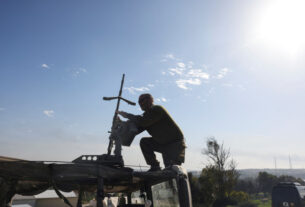A lachrymose river runs, like the Tigris, through Samantha Ellis’s new book “Chopping Onions on My Heart: On Losing and Preserving Culture.” In almost every chapter, Ellis mourns the loss of yet another aspect of Iraqi Jewish culture, chief among them, the Judeo-Iraqi Arabic language, but also the nabug fruit, and the ability to fit in. Ellis, a playwright and the daughter of Iraqi Jews who migrated to Britain (her father via Israel), is determined, as the subtitle indicates, to hold on to and share with readers that colorful world that her parents left behind. And, as I read the book, I saw why. It’s impossible to finish this memoir and not come away with a desire to claim as your own fantastic and near-forgotten expressions such as “Yethrem basal all ras efadi!” (you’re chopping onions on my heart!), like the English “you’re rubbing salt on the wound” and “ashteedek” (long live your hands), a beautiful compliment to a chef. You might even sign up for a class at the Oxford School of Rare Jewish Languages, as Ellis has, or tune into the latest episode of the podcast “Heritage Words” hosted by Hebrew Union College professor Sarah Bunin Benor.
Two years ago, writing about an exhibit at the Jewish Museum in New York, Sasha Goldstein-Sabbah, a scholar of Baghdadi Jewish history, declared: “The Sassoon family is having a moment.” Indeed, it’s not only the “Rothschilds of the East,” but Iraqi Jews more generally who are having their little-known history coming to light. Certainly, this is true in Britain, where much of it has been emerging from a deeply personal perspective. Ellis’s memoir joins a choir of voices of second- and 1.5-generation Iraqi Jewish Brits. In the last five years, we’ve been treated not only to Joseph Sassoon’s family history, but also to Carol Isaacs’s “The Wolf of Baghdad,” a stunning graphic novel with a stripped-down palette, all twilight and dawn, liminal temporalities to go with the ghostly figures, a book non-chronological like memory itself; Avi Shlaim’s anti-Zionist polemic-cum-memoir, “Three Worlds,” a story of a man who never forgave the Zionist state for downgrading his high-status people long, long after he left it, moved to England, and rose to prominence as a historian at Oxford; and now Ellis’s memoir, a mix of historical research, insightful reflections on all matter from antisemitism to parenting, and recipes.
Ellis begins with the fear that her “milk language” is at risk of extinction. But in order for us to care about the language, we must first know who spoke it. So, Ellis offers us a history of the Jews of Iraq—Jews who were there long before the Arabs, who wept by the rivers of Babylon, remembering Zion after they had been exiled from the Kingdom of Judah in 597 CE. They were Jews who chose to stay when offered the chance to return from the diaspora, Jews who slept on the roof, listened to Salima Murad, ate amba (Ellis recycles the myth that it was a Sassoon who invented it), went to the Alliance Israëlite Universelle schools and, a decade after the Farhud, all but disappeared (but not Ellis’s mother, who left almost two decades later, which makes her stories some of the most recent in Iraqi Jewish history). We follow Ellis to the British Museum, where she studies artefacts, like a kohl stick, reminiscent of the kohl pots her mother brought with her to England; the Cyrus Cylinder, a kind of human rights proclamation that curiously is housed in the Iran section of the museum; and the magic bowls made by Jewish women. Each object, memory and fact comes with its own set of questions and ruminations.
Each object, memory and fact comes with its own set of questions and ruminations.
Throughout the memoir, Ellis struggles to embrace what is clear to the reader: that she is, not despite, but because of her heritage, a modern woman in multicultural Britain. She writes about “homesickness—for a place I’d never been” and feeling “alien.” When she eats the nabug fruit for the first time, she thinks she is returning “where I belonged. Where I made sense.” Is it where she belongs? When Isaacs imagined returning to the Iraq of her parents’ time in “The Wolf of Baghdad,” she draped her ghostly figure in an abaya. She understood her contemporary Jewish, modern self had no place there. But Ellis gets trapped in nostalgia—for a place she hasn’t visited and can’t visit, for a place she can’t fully capture, for all the research in the world. There is pathos and humor in this failure. When she learns Judeo-Arabic at the Oxford School, she excitedly greets her mother with “s’bakh el heir” (morning of wellness), but her mother responds, “We didn’t use those words … We just said hello.”
At one point, Ellis relates that she’s worried she would always miss things “writing in a language that wasn’t fully mine.” I startled and not only because she’s London-born, and English, as she says, was “the language I grew up in, the language of all my friendships and relationships, the language of my child,” but also because her prose is so truly masterful. Not a minute earlier, I had inserted a series of checkmarks on the margin of the page, loving the way she discussed Sami Michael’s “Victoria,” that scene where illiterate Victoria and her girl cousins discover a message on a paper airplane and ask the rabbi what it says, and Michael renders the message (comparing rabbis to prostitutes) in Judeo-Iraqi Arabic, using the Hebrew alphabet. “This is how my language exists on the page now,” Ellis writes, “as a snippet of scurrilousness written on paper folded into an aeroplane and flown onto a roof, found by a people who can’t read it, translated by someone who is outraged about it, and printed in a book in such a way that not everyone can fully access it.”
There are moments when Ellis decides to release her tight hold on the idea of authenticity, to accept that she is (as all of us are) a product of different cultures and heritages, of yesterday and of today. These moments seem fleeting, but they impart a message, one not of loss, but of gain, not of the lachrymose, but of the joyful. What we gain through Ellis, as well as Isaacs and others of her generation, is a new body of Anglo-Iraqi Jewish literature.
Karen Skinazi, Ph.D. is Associate Professor of Literature and Culture and the director of Liberal Arts at the University of Bristol (UK) and the author of “Women of Valor: Orthodox Jewish Troll Fighters, Crime Writers, and Rock Stars in Contemporary Literature and Culture.”




